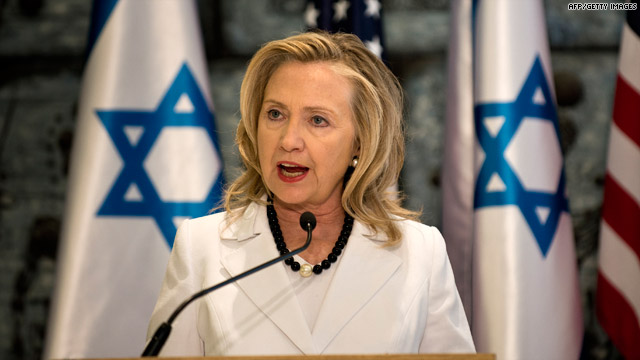UPDATES
Clinton reveals some vital peacemaking home truths
June 23, 2014 | Allon Lee

It has not received much coverage in Australia, but Hillary Clinton’s new book “Hard Choices” chronicling her time as US Secretary of State in President Barack Obama’s first administration, upends the oft-made assumption that Israeli-Palestinian peace talks were stillborn between 2009-2012 because of the stances of Israeli Prime Minister Binyamin Netanyahu.
The issue that has received the most attention is her claim that she opposed the Administration’s insistence on a settlements building freeze which was intended to “help reestablish America as an honest broker in the peace process, softening the perception that we always took the side of the Israelis.” It was a policy that Clinton admits was “hard line” and “didn’t work.”
Clinton observed that Obama’s very public demand for the freeze, which was initially refused but later agreed to for ten months by Netanyahu, “made it very hard for either one to climb down or compromise.”
The freeze was pushed by Obama’s Chief of Staff Rahm Emanuel who argued for “a strong position right out of the gate; otherwise [Netanyahu would] walk all over us.” The President was sympathetic to that argument, she writes.
But, according to Clinton, she and Obama’s special Middle East envoy George Mitchell opposed the freeze because:
we could be locking ourselves into a confrontation we didn’t need, that the Israelis would feel they were being asked to do more than the other parties, and that once we raised it publicly Abbas couldn’t start serious negotiations without it.
Politically, the chief beneficiaries were the Arab states who were “happy to sit on the sidelines and use the dustup as an excuse for their own inaction. And Abbas, who had consistently called for a halt to settlement construction for years, now claimed it was all our idea and said that he wouldn’t come to the peace table without a moratorium on settlement construction.”
Clinton writes that she “agreed with Rahm and the President that if we were going to revive a moribund peace process, we had to take some risks” but this is disingenuous. She must know – but significantly never mentions – that less than six months earlier, during the final months of George W. Bush’s presidency, Netanyahu’s predecessor, Ehud Olmert, offered Abbas the equivalent of all of the West Bank, most of east Jerusalem and a refugee package but never received a response. Including this salient fact would have made Abbas’ culpability for the lack of peace even more egregious.
She makes plain that the freeze, which she repeatedly describes as “unprecedented” was sincerely implemented. Moreover, despite Israel’s public objections to extending the freeze to east Jerusalem, according to the book “while the ten-month moratorium remained in place, there was little if any additional construction there [in east Jerusalem].”
What is fairly apparent is how far Clinton and Netanyahu have come since the 1990s when her husband was President, and, as memoirs from insiders make clear, had a rocky relationship with Netanyahu during his first Prime Ministership from 1996 to 1999. Here she describes Netanyahu as a friend, a confidant even, a man receptive to reasoned arguments, and a leader who is clearly not an obstacle to peace.
Quite the contrary, in fact, Clinton recounts a private conversation where Netanyahu tells her “What concerns me is not [Palestinian President Mahmoud Abbas’] territorial demands, but his understanding and acceptance of my security needs…I’m a realist. I know what’s needed to close the deal.”
In fact, in contrast to the unfortunate practice of the Obama Administration often seemingly happy to be more critical of Netanyahu than of Abbas for problems between the Israelis and Palestinians, here it is Abbas who receives more biting criticism, with Clinton questioning his commitment to peacemaking:
“I sometimes thought that while Arafat had the circumstances required to make peace but not the will, Abbas may have had the will but not the circumstances, though at some of our more frustrating moments, I wondered about his will, too.”
Although the settlements freeze was an Administration initiative, and backed Abbas into a corner, Clinton doesn’t let Abbas off either, writing that “he didn’t know how to get out of it, but this was a predicament of his and our own making.”
Then, when Abbas agreed to restart talks in 2010 with only two weeks left till the settlement freeze lapsed and demanded the freeze now be extended if talks were going to continue, she quotes Obama’s special Middle East envoy George Mitchell telling him “How is it that something which you described as worse than useless eight months ago has now become indispensable?”
Significantly, in light of the current contretemps over the Abbott Government’s policy of not referring to east Jerusalem as occupied, Clinton explained that “We had never referred to Jerusalem as a settlement” and that in the US did not oppose construction there on the principle that it was occupied but more because it potentially affected the negotiating process.
Clinton is of course touted as a front-running potential Presidential candidate in 2016. If she wins, it will be interesting to see what effect the benefit of the hindsight she offers in her memoirs has on the policies she might adopt on the long and unforgiving path to peacemaking.
– Allon Lee
Tags: Israel





